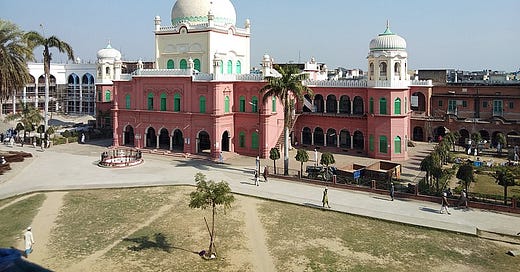As the U.S. Muslim community shifts from relying on students educated overseas to those trained within the United States, several programs have emerged to support this transition. I know childhood friends who went to study in South Africa. How times have changed.
Many of these programs often self-describe as “alim courses” or “dar ul uloom”. The word “alim” means “scholar.” And “dar ul uloom” translates to “house of knowledge.” Some trace their roots to the Darul Uloom Deoband, founded in 1866. Students who complete this curriculum are called maulanas. Those who do an extra one to two years on fiqh are called muftis.
With the help of my team, I have published a list of these programs below.
Darul Ulum Al-Ashrafiyya (CA)
Institute of Knowledge in LA (CA)
Kufa Institute (FL)
Madinatul Uloom (FL)
Darul Uloom Chicago (IL)
Darul Qasim College (IL)
Institute of Islamic Education (IL)
Sabeelur Rashaad Educational Foundation (IL)
Institute of Noble Knowledge (MD)
Islamic Community Center of Laurel (MD)
Michigan Islamic Institute (MI)
Darul Uloom Michigan (MI)
Darul Uloom Detroit (MI)
Miftaah (MI)
International Islamic University of Minnesota (MN)
Darul Uloom New Jersey (NJ)
Darul Ulum Central Jersey (NJ)
Darul Uloom Hamidiyyah (NJ)
Darul Fath New Brunswick (NJ)
Darul Uloom New York (NY)
Darul Uloom Al-Madania (NY)
Muhammadi Masjid Alimiyyah (NY)
Jamiatul Uloom (NY)
Darul Quran was Sunnah (NY)
An-Noor Institute (NY)
Al-Maqasid (PA)
Riihlatul Ilm (PA)
Darul Uloom Seattle (WA)
Islamic Seminary Foundation (TX)
Qalam Seminary (TX)
Ihya Foundation (TX)
Amatur Rahman Girls Academy (TX)
Hamd Institute (TX)
Tanwir Institute (VA)
I excluded Zaytuna College and Bayan Islamic Graduate School from this list because their programs are structured more like Islamic studies programs at liberal universities rather than traditional Islamic studies.

